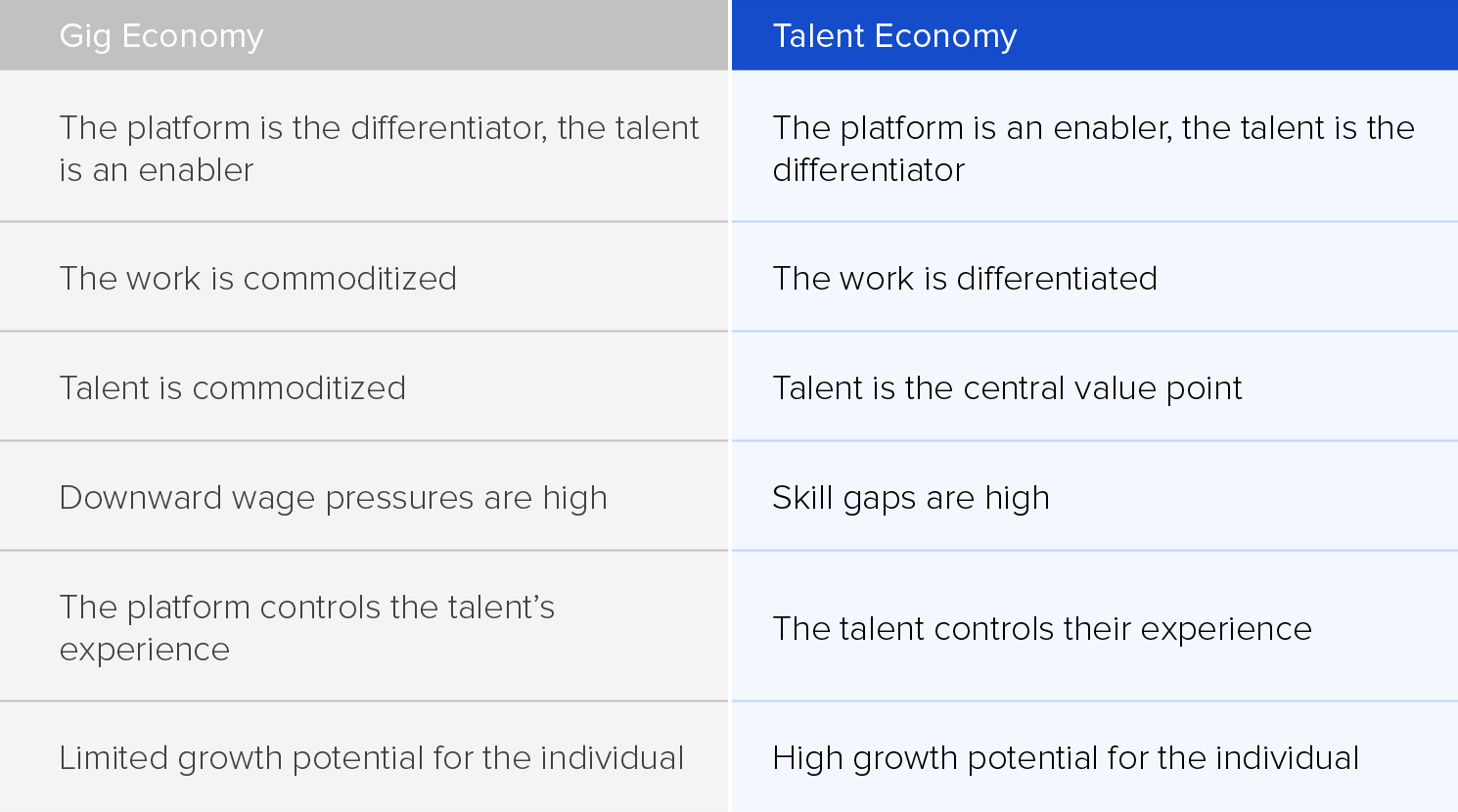
We’ve seen a rise in the adoption of on-demand labor. While this might seem unusual, it’s actually a pattern decades in the making.
Every major economic disruption of the last 20 years has contributed to a widespread shift to on-demand labor. This ecosystem is often referred to as the “gig economy,” and it has quickly become a way to connect companies and consumers with independent workers at scale. About 36% of U.S. workers are currently engaged in some form of gig work, and studies estimate that, if current trends continue, this number will rise to 50% by 2027.
The gig economy helps companies control their fixed labor costs, and it has benefits for workers as well – flexible hours and low barriers to entry, for example. For many, the gig economy is an easy way to make additional income, or to transform their work schedule into something that can accommodate their busy life.
The gig economy model breaks down, however, when it comes to the need for differentiated services, especially those that require a certain degree of skill – like IT field service. A closer look at the different types of on-demand work shows us why.
By commoditizing services that are consistent, repeatable, and don’t require additional training, the gig economy makes accessing these services easier and more cost-effective. Think about an experience using Uber or Instacart. You don’t pick out your driver or shopper because, practically speaking, it doesn’t really matter who is driving the car or fetching the groceries. The application simply routes your request to one of many workers capable of accomplishing a straightforward task.
On the other hand, when you’re looking to resource a networking, low-voltage cabling, or ATM job, who you choose to complete the work matters. You want to make sure they have the training and experience necessary to do a quality job.
In other words, the differentiation between workers is essential to the work being done. This is what makes the gig economy different from what’s being called the talent economy.

(Source: Toptal)
In the gig economy, the platform is the differentiating factor because it offers ease of access to a broad network of undifferentiated service providers. In the talent economy, the talent is the differentiating factor. Customers engaging with platforms in the talent economy need the unique skill and expertise of individuals.
In categories like field service that revolve around high-volume, skilled labor, both platform and talent are integral to making the most of the on-demand model. Users need to cycle jobs through the platform with speed and efficiency, and they need to be confident that the technicians they source have the right skills. This means that field services occupy a unique niche in the talent economy.
However, challenges crop up when field service companies approach the talent economy with a gig-economy mindset – something we see all too often with disappointing results for everyone involved. How many times have you said or heard, “Platform labor doesn’t work for field service” or “I tried using on-demand labor once and had a terrible experience”?
In those situations, we can almost always trace the poor outcome back to a handful of factors: incommensurate pay, inadequate vetting, and unclear expectations. The good news is that after 12+ years in business and experience working with thousands of companies, we know what it takes to find success in the talent economy.
Getting the talent economy right
In the gig economy, the work is commoditized, making the workers interchangeable. An Uber ride is an Uber ride is an Uber ride.
In the talent economy, the work is specialized, meaning the workers must be uniquely qualified for and aligned to each job.
IT field service is unique in that the technician represents your company and brand to the end customer. If something goes wrong on site, the entire project and customer relationship could be in jeopardy. That’s why quality cannot be an afterthought in the talent economy; it must be front and center.
At Field Nation, we believe companies should approach on-demand labor with the outcome they are driving toward in mind. This means making sure labor resources have what they need and paying careful attention to vetting, communication, and the rate-setting processes. Remember the three factors mentioned above that lead to poor outcomes with on-demand labor?
Imagine if you paid a full-time employee a rate that was incommensurate with their level of experience and the job you were asking them to perform. Imagine if you hired them without first verifying their references and experience. Lastly, imagine if you sent them to a job site with an unclear scope of work or missing information. The outcome would be terrible, and the technician would likely quit in search of better opportunities.
Just as you apply rigor and discipline to the process of finding the right full-time employee, you must apply the same mindset to platform labor. The process will be much more efficient and streamlined due to platform automation features, but the focus on quality will remain the same.
Ultimately, when it comes to leveraging on-demand labor in field service delivery, successful adopters take a programmatic approach instead of a transactional approach. They take full ownership of the strategy and execution that goes into finding their ideal labor mix, setting prices, and vetting technicians at scale. Unsuccessful adopters turn to on-demand without this sense of ownership on an ad hoc basis, and their outcomes suffer as a result.
Over the past decade, we’ve worked with clients to evolve beyond the gig economy mindset to ensure they’re set up for success in the talent economy. We’ve invested in three key areas to help clients win new business profitably and scale their service delivery effectively – pricing and coverage intelligence, workflow automation, and our network of talent. It’s through these investments that clients are able to harness the power of on-demand labor and use it as a strategic business advantage.
Looking forward
As IT field service providers continue to adapt to ever-shifting end customer demands, the ones who are thriving (not just surviving) are augmenting their workforce with on-demand labor and a talent economy mindset — implementing best practices that help them find the best talent, provide the best customer experience, and allow them to scale on their terms. To the service leaders who still have doubts about the viability of on-demand labor, let’s talk about your concerns. They’re probably the same concerns every company has when they’re new to on-demand labor, but I assure you – there’s a strategy for addressing them. And they come from a talent economy mindset.






